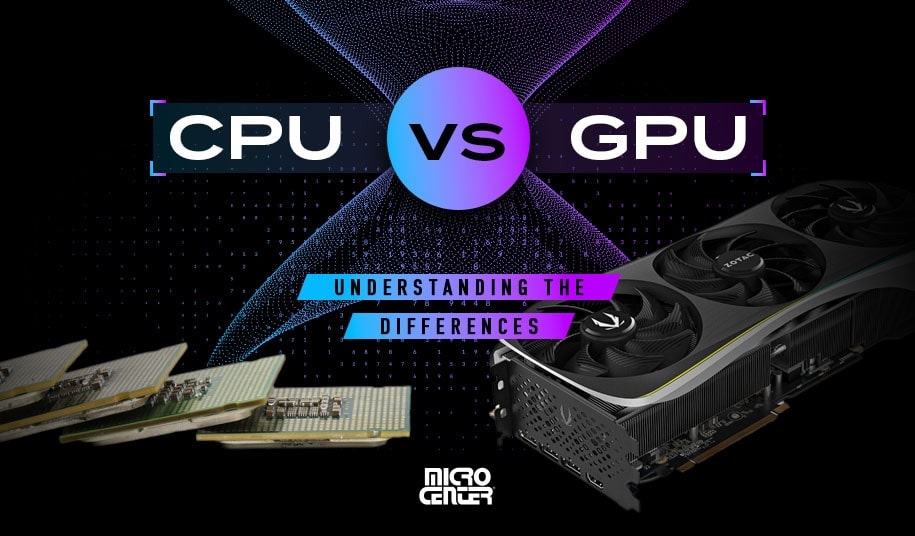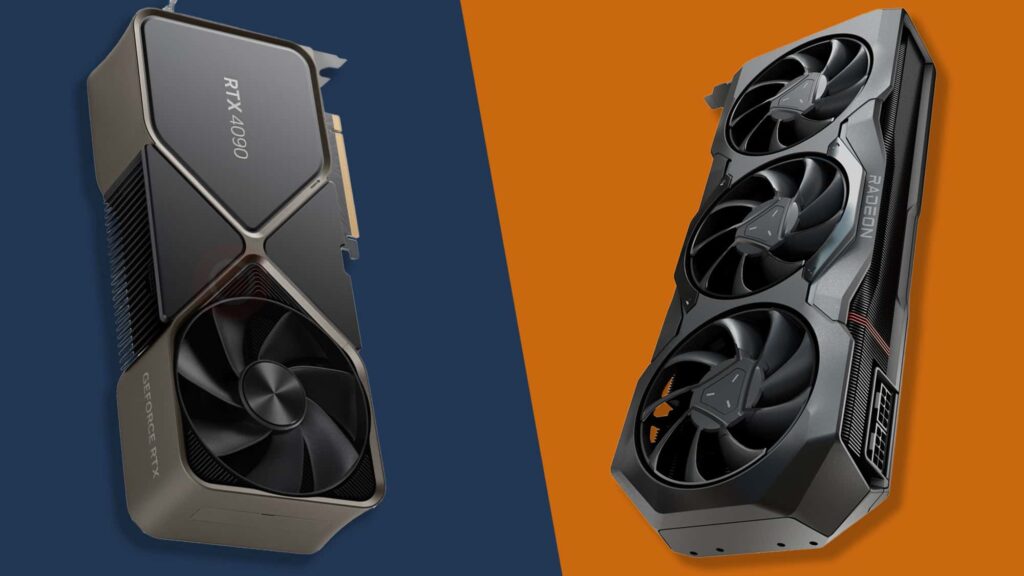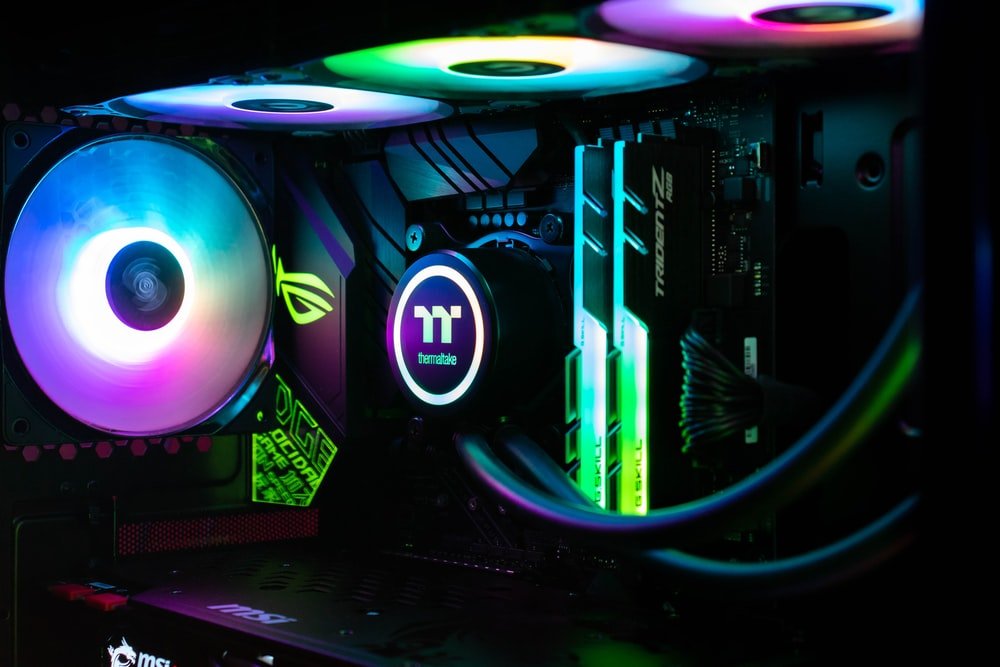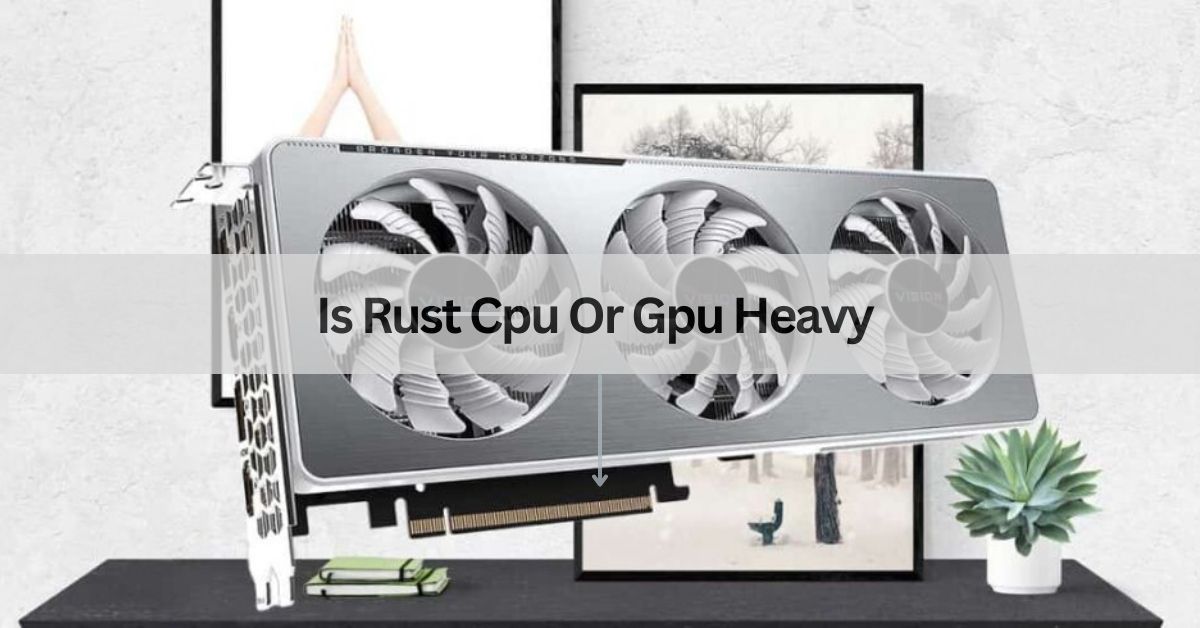Is Rust Cpu Or Gpu Heavy – Find Out Now!
I played Rust on different PCs, and I noticed it needs a strong CPU more than a GPU. When I upgraded my processor, the game ran much better, even with the same graphics card. If you’re having lag issues, focus on your CPU first.
Rust is mostly CPU-heavy because it focuses on fast and safe code. It does not use the GPU much unless the program is made for graphics or special tasks that need GPU power.
This article will discuss “Is Rust CPU Or GPU Heavy”.
Is Rust more CPU or GPU heavy?

Rust is generally more CPU-heavy than GPU-heavy due to its reliance on calculations for physics, world generation, and complex systems. However, the GPU plays a significant role in rendering graphics. A balance between both is essential for optimal performance. High CPU performance ensures smoother gameplay, while a capable GPU enhances visuals.
Read More: Fallout 3 Intel Gpu Fix – Step-By-Step Solution!
Does Rust need a good GPU to run smoothly?
Yes, a good GPU is necessary for Rust to run smoothly, especially at higher resolutions or with detailed graphics settings. The game’s demanding visuals, including textures and effects, can strain lower-end GPUs. Ensuring your GPU meets or exceeds the recommended requirements is key for a seamless experience.
What kind of CPU is best for playing Rust?
A CPU with multiple cores and high clock speeds is best for Rust. Processors like Intel i5 or Ryzen 5 with at least 4 cores are recommended. Rust benefits from CPUs that can handle complex tasks efficiently, ensuring minimal stutters and better performance in intense gameplay situations.
Can Rust run on a low-end CPU?
Rust can run on a low-end CPU, but performance might be affected. Players with low-end CPUs may experience slower load times, stutters, or reduced frame rates. Lowering settings like draw distance and texture quality can help improve performance on less powerful systems.
How much GPU power does Rust require?
Rust requires a GPU capable of handling high graphical fidelity, especially for 1080p or higher resolutions. A GPU like GTX 1060 or better is recommended for medium to high settings. For basic settings, entry-level GPUs might suffice, but frame rates could be lower.
Should I upgrade CPU or GPU for Rust?
If Rust’s performance issues include stuttering or slow load times, upgrading the CPU is advisable. For graphical issues, such as low frame rates or poor visuals, a GPU upgrade is more beneficial. Assess your current hardware to determine which component is limiting performance.
What CPU is recommended for Rust?
A mid-to-high-range CPU with at least 4 cores, such as Intel i5-9600K or Ryzen 5 3600, is recommended for Rust. These CPUs can handle the game’s demanding physics and calculations effectively, ensuring smoother gameplay and better multitasking during sessions.
Is CPU or GPU heavy game?
Rust leans more towards being a CPU-heavy game, focusing on processing physics, AI, and interactions. However, it also requires a strong GPU for rendering graphics. A balanced setup ensures that both components work together efficiently for optimal gameplay.
Why is Rust such a heavy game?
Rust is a heavy game due to its open-world design, detailed environments, and complex systems. Physics simulations, player interactions, and high-resolution textures contribute to its demands. These features require significant processing power from both the CPU and GPU.
Is Rust more CPU or GPU intensive?
Rust is slightly more CPU-intensive because of its emphasis on physics and calculations. However, it still requires a powerful GPU for smooth graphics rendering. A balanced hardware setup ensures consistent performance across all aspects of the game.
Is Rust a CPU or GPU game?
Rust is both a CPU and GPU game. While the CPU handles essential tasks like physics and AI, the GPU is critical for delivering smooth and visually appealing graphics. Balancing these components is essential for an optimal experience.
Is this game CPU intensive or GPU intensive?
Rust is primarily CPU-intensive due to its need for processing physics, AI, and player interactions. However, it also has GPU-intensive aspects for rendering graphics. Both components are important for achieving smooth gameplay.
Is Rust CPU or GPU heavy for gaming?
Rust is more CPU-heavy for gaming but requires a capable GPU for high-resolution textures and effects. A good balance between both components helps maintain consistent performance and visual quality during gameplay.
Is Rust CPU or GPU heavy for a laptop?

For laptops, Rust is demanding on both the CPU and GPU. It requires a strong processor for handling tasks and a dedicated GPU for rendering graphics. Gaming laptops with mid-range to high-end hardware are recommended.
Read More: Can You Use Cpu Psu Cable For Gpu – What You Need To Know!
Will upgrading my CPU improve Rust performance?
Upgrading your CPU can significantly improve Rust’s performance, especially if your current processor struggles to keep up with the game’s demands. Here’s how a CPU upgrade can make a difference:
Faster Load Times
- A better CPU processes game data more efficiently, reducing load times.
- Large maps and player interactions load faster, making your gameplay smoother.
Improved Frame Rates
- A more powerful CPU ensures stable and higher frame rates, especially in crowded areas.
- It reduces stuttering and frame drops caused by inadequate processing power.
Efficient Multitasking
- Modern CPUs with multiple cores handle background tasks alongside the game.
- Streaming, voice chats, or recording gameplay runs smoothly without affecting Rust’s performance.
Better Handling of Physics and AI
- Rust relies heavily on the CPU for physics simulations and AI interactions.
- A faster CPU can manage these tasks seamlessly, providing a better in-game experience.
Enhanced Performance in Busy Areas
- In areas with high player density or complex structures, the CPU processes additional data.
- Upgrading helps prevent slowdowns in such demanding scenarios.
Key Considerations for a CPU Upgrade
- Core Count: Choose a CPU with at least 4 to 6 cores for better multitasking.
- Clock Speed: Higher clock speeds result in faster data processing.
- Compatibility: Ensure your motherboard supports the new CPU.
Upgrading your CPU is a worthwhile investment for Rust if you’re facing performance issues tied to processing power. Combine it with a good GPU for the best results.
Does Rust use multiple CPU cores effectively?
Rust utilizes multiple CPU cores effectively for tasks like physics calculations and AI. A multi-core processor enhances performance, ensuring smoother gameplay and quicker processing of in-game systems, especially in large open-world environments.
What are the minimum CPU and GPU requirements for Rust?
The minimum requirements for Rust include an Intel Core i5-2300 and a GTX 670 GPU. These specs allow the game to run at low settings. For a smoother experience, meeting or exceeding the recommended specs is ideal.
Why does Rust lag even with a powerful GPU?

Rust might lag with a powerful GPU if the CPU is not up to par or if background processes are consuming resources. Other causes include outdated drivers or insufficient RAM. Optimizing in-game settings and system performance can help.
Read More: Why Does My Gpu Spike To 100% – Top Reasons You Need To Know!
How to optimize Rust for better performance on any PC?
To optimize Rust, lower settings like shadow quality, draw distance, and texture quality. Close unnecessary background processes, update drivers, and ensure sufficient cooling for your system. Tweaking these settings can significantly improve performance.
FAQs:
1. Is Rust CPU or GPU heavy?
Rust mostly uses the CPU because it focuses on fast and safe code. The GPU is used only for graphics or special tasks.
2. Can Rust be used for GPU programming?
Yes, Rust can be used for GPU tasks with libraries like wgpu and CUDA bindings. These help in running code on the GPU for better speed.
3. Is Rust good for high-performance computing?
Yes, Rust is good for high-performance tasks because it provides speed and memory safety without a garbage collector.
4. Does Rust support parallel processing?
Yes, Rust supports parallel processing with libraries like Rayon. These libraries make it easier to run tasks at the same time.
5. Is Rust faster than C++?
Rust and C++ have similar speed, but Rust offers better memory safety. C++ might be faster in some cases due to its long-time optimization.
6. Does Rust use more memory than other languages?
Rust manages memory well and often uses less compared to languages with garbage collection. It gives control over memory usage without slowing down performance.
Conclusion:
Rust is mostly CPU-heavy, but it can use the GPU for tasks like graphics and data processing. It offers high performance with memory safety, making it a good choice for many applications. Rust supports parallel processing and provides control over memory use without slowing down performance. With the right libraries, Rust can also handle GPU tasks effectively.


